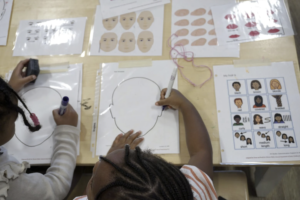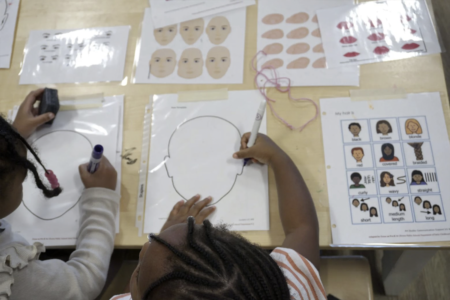
By Nicol Russell, Ed.D.
As a young child, I’d help my dad comb through coupons in the Sunday newspaper each week. With his guidance, I’d find familiar pictures and letters and pieces together to recognize words, connecting the text with meaningful ideas and objects from my life before I could even read. I didn’t know it then, but this weekly activity not only created fond memories with my father, but it helped build a foundation of important pre-reading skills that would support my journey to literacy. Today, just one in three fourth graders are reading on grade level, signaling an urgent need to ensure all children can build reading and writing skills even before they enter kindergarten.
State lawmakers have responded to the nation’s call for action. Most states have adopted policies to transform classroom instruction to teach young children to become competent, confident emerging readers through evidence-based pedagogy aligned with the science of reading. Now, it’s time to turn those policies into strong practice — from the classroom to the living room. As an early childhood curriculum leader who started her career in the classroom, I’ve seen first-hand the importance of ensuring educators — including those who teach children in the critical year before kindergarten — have access to high-quality curriculum, assessments to measure learning progress over time, and meaningful training on how to best use those tools with their unique students.
I’ve also seen, in my work and as the parent of a young reader, the importance of building a strong home-school connection. In a recent survey, 91% of early childhood educators underscored the importance of parent/caregiver engagement for developing early literacy skills in young students. This echoes a wide body of research that shows the positive links between involved families and student achievement. So, how can families help young children build a strong foundation for reading and writing? Here are some suggestions that are both fun and free.
Read.
It seems like an obvious suggestion, but the power of reading — as families and independently — cannot be overstated. Research shows the number of different types of literacy materials in the home, the amount of home reading, and the opportunity to discuss reading are all related to reading proficiency. Families can start their literacy journey together by taking a trip to the public library together. At the library, children can engage in storytime events and explore the stacks for books and magazines that catch their attention. Adults, too, should pick titles they are interested in reading independently, as modeling good reading habits is also beneficial. Back at home, families are encouraged to set aside time each day to read together. Families can make storytime more engaging for children by pausing throughout the story to ask questions about the plot or about how certain themes in the story make their child feel; using different voices for the different characters; or even acting out the story with toys.
Incorporate literacy skills into everyday activities.
Families don’t have to spend a lot of money on activities or programs to help their children on their journey to literacy. There are many ways to incorporate reading and writing skills into everyday life that are both free and fun.
Try, for example, simply making a list. Lists are an easy way to get your child to write. Consider:
- Making a grocery list. Ask your child about their favorite meal or treat and work together to write down all of the ingredients you’ll need to make it. For younger children, you can read your grocery list aloud, playfully emphasizing the letter sounds and showing them the ingredients at the market to keep them engaged.
- Writing the steps of an everyday chore. Invite your child to write and illustrate the steps in an everyday chore, like doing laundry. Then use that list for your child’s future reference.
- Taking an order. Role play you are dining in a restaurant, and encourage your child to write down your order.
At the end of the day, ask specific questions.
It can be difficult for young children to remember what they did during the day so asking, “What did you do today?” may not generate a lot of conversation. So, ask different, more specific questions to help them recall some events, such as:
- “What story did you hear or book you read today? What was it about?” Retelling stories encourages comprehension, sequencing, and use of narrative language, which are essential for literacy.
- “What was the best song you sang or heard today?” Songs and rhymes strengthen phonological awareness and help children recognize sound patterns in words.
- “What new word did you hear today? Help me learn what it means.” Discussing or introducing new vocabulary enhances a child’s language skills and comprehension.
The nation is grappling with a literacy crisis that has only been exacerbated by the pandemic. We have an opportunity to reverse course — but a new law, curriculum, or literacy coach alone won’t bring about the real change our children need. Policymakers, educators, advocates, and families alike must unite to support our young readers. And even simple actions, like combing through the Sunday newspaper for coupons, can have a lasting impact.
Dr. Nicol Russell is the Chief Academic Officer at Teaching Strategies.







